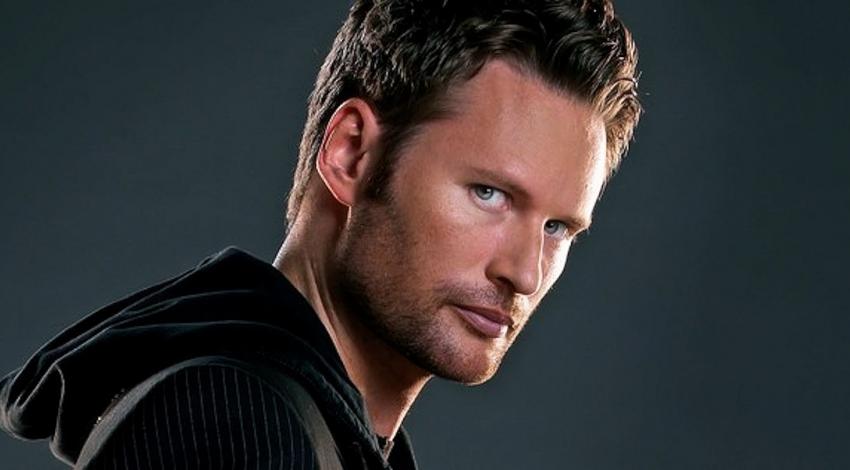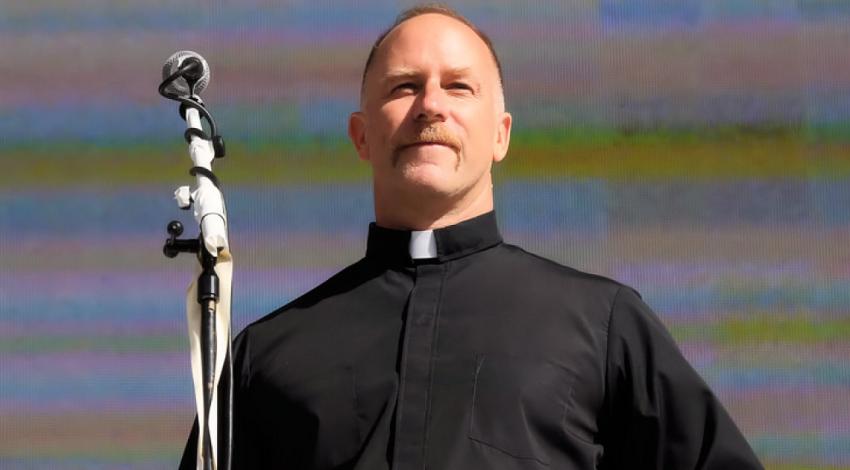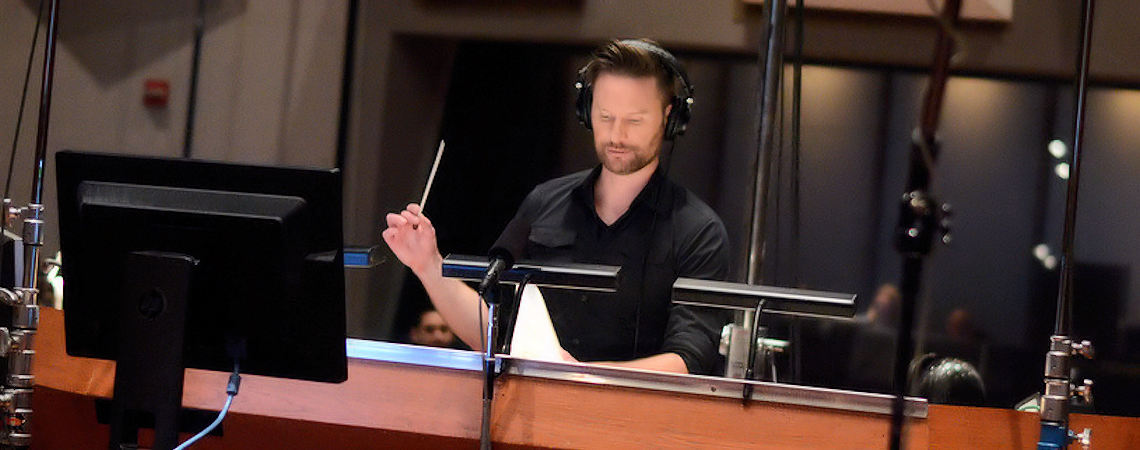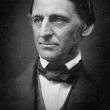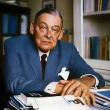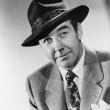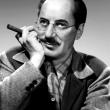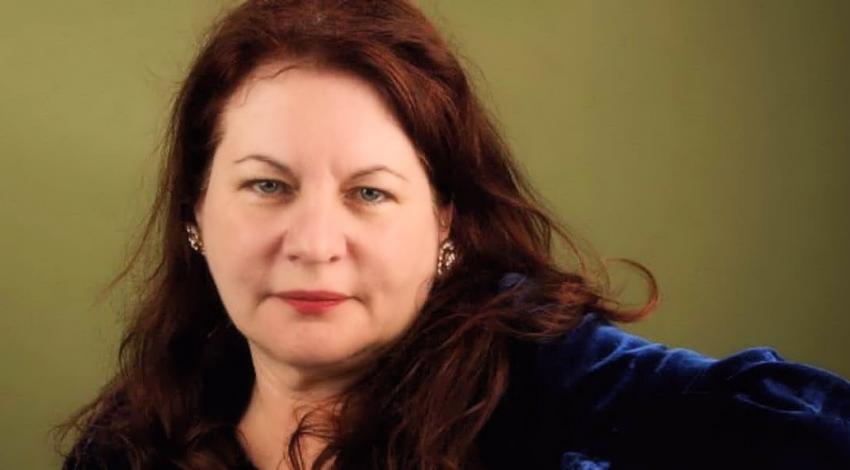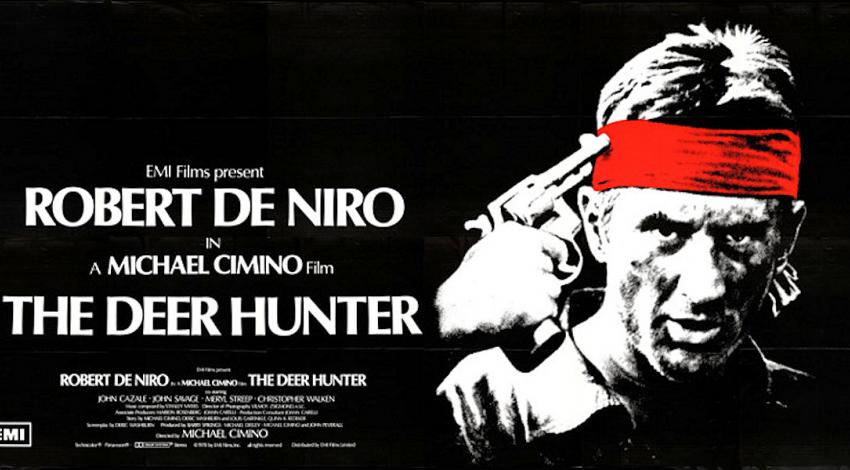Brian Tyler - On "Constantine"

Brian Tyler | Composer
How did you first get involved with Constantine?
quote-leftOriginally I was called in to meet with Francis Lawrence (the director) and editor. Apparently Frailty had been used to temp a few key scenes in the rough cut, and the director found it really interesting. He was new to the world of film scores, but he knew what he liked when he heard it, so we met and he showed me the film. At the time I saw it, it was a bit longer, but it still felt tight and it really knocked me out. So I gave him my vision about what I thought the score would be - something that emphasized the reality of the world, very dark, and makes the audience feel uncomfortable. That was the approach in the beginning - we took a "darker is better" direction on the score. It was still thematic, but very low-register, brooding - and unapologetic in the way that there was no "winking" with the audience. Even though the film is based on the graphic novel Hellblazer, it's not a "comic" in a "comical" way. I think that people tend to mistake the two - "comic" doesn't mean "comedic"! And that's where the road forked. Initially we wanted to emphasize the "Hell" in Hellblazer - it's a story about a guy who has only a few months left to live, because he's dying from cancer, and he's battling the devil, and trying to save a girl from Hell. Hellboy is an example of something that's a bit more tongue-in-cheek, and our film was dark and gritty - it was shot that way, too.
So what happened?
quote-leftAfter I finished the score, and conducted and recorded it, it was felt that after watching it in context, it might have benefited from some humor being injected into the music to add some levity. The basic idea was that we could support some of the wisecracking in the film with music. We were all aware from the first day on the film that there were wisecracks in the film, but we didn't hit those comedy beats. To change that, we added a bit more production polish - not as much ancient instrumentation in the score. Some electronic elements were brought in to bring it a more buoyant feel, and some cues because quirky and fun, and winky. Ultimately it's the studio's film. I did what I thought was right, and as I went, I addressed the new direction and wrote music that would modularly fit in with the foundation that had been laid down. Helping you with the new material was composer Klaus Badelt - how did he come on board? I have a lot of respect for Klaus. We had all talked about it and we were in agreement regarding him coming on board. I had been on the film for six months, and we only had a few weeks left. Klaus and I collaborated on the new material and really tried to come up with some key ideas to hone in on and have the greatest impact on certain spots - so that the studio would get what they wanted, and the score would still retain what we liked about the film. I was pretty tired at the end of the project - I had put my all into it. I had been writing out four or five different cues before I would even show them the one cue I was happy with for any given scene - so it was thousands of pages of music! I was certainly ready for vacation time. It was done to alter the tone of the film in a bit of a way to make it have a wider appeal. I was a fan of Hellblazer, as was Francis, and it initially was a collaboration of what everyone wanted to see on screen. To their credit, the changes weren't overly drastic - like a techno score - we kept the same approach, and after a few weeks of writing new music, I was out on the stage conducting the new music. It was quite a whirlwind experience! I got to know Klaus, and he has his own fascinating technique of doing things. I had never collaborated with someone on any type of writing, except maybe in a band - it was a new experience, very interesting and one I'll never forget!
Were you involved in any of the special features for the DVD?
quote-leftWell, the scoring sessions were all filmed and we did some behind-the-scenes stuff, and even interviewed some of the session players, which is really cool. I like it when they film from inside the orchestra so you can get a sense of what it's like, and see how some composers are in the control room, and others conduct. There was a whole main title sequence they did that was amazing, and it was cut from the film - I wrote a piece of music for it. The whole title sequence was really cool. Hopefully that will be on the DVD as well. There are some really great scenes that were cut from the film. Some of them were really brutal and some of them provided more backstory. Hopefully those scenes will be on the DVD. You're currently scoring The Greatest Game Ever Played, which reunites you with Frailty director Bill Paxton. How did you get on Frailty? Well, the first film released that I did was Six String Samurai, but it was Frailty that helped get me some more exposure. Also, strangely enough, Six String was a bit of an anomaly because it was guitar based, and not orchestral, which is my main thing. So at the beginning, I was known for something that wasn't my thing - even though I loved doing it, and it was fun - but more of a side thing. So when I got Frailty, it was like, "ahhhhhh"! It had that thick orchestral style, with a bit of the avant-garde, and some weird 12-tone stuff as well as choir, and all sorts of strange things on that film. It turns out that Terror Tract, Sirens, and Panic were all being used in the temp score for Frailty. Bill was just hearing the music, not knowing who the composer was, and really liked how it sounded "old-school". So he figured that I was an older guy - he had surrounded himself with the "old guard" on the film; Bill Butler (Jaws) shot it, and Arnie Glassman edited it - they had been around forever and were masters. The idea that Bill had was that he would team up with these seasoned veterans. So they brought me in, and the shock and horror on their faces was really funny. But we started talking, and it's hard to describe how well we hit it off, but we had the exact same vision and approach for the music. So that's how I got the movie.
And Frailty definitely pushed you out into the spotlight! Yeah - that movie is directly responsible for my involvement on The Hunted. I had done some other movies in between the two, but the Monday after Frailty came out, I got a call from William Friedkin, who saw the film at a matinee over the weekend, and the thought it was one of the ten best horror films he's seen. And he loved the score - he went to Tower Records and got it, then called me up and told me that I had to do The Hunted. So it's strange how it directly led to something, but there were other projects in-between. Yeah - like Bubba Ho-Tep, Darkness Falls, and Vampires: Los Muertos - all horror films! Yeah, there was a streak there of a bunch of horror films, as well as Plan B, which was a big-band score. It sticks out like a sore thumb in that list, but it was the guy who ended up directing Children of Dune, so that was good! Darkness Falls was the "fun" version of Frailty in a weird way - it definitely as an element of the "winky" that we were talking about earlier with Constantine.
So you got The Hunted because of Frailty.
quote-leftYeah. It was a cold, harsh film with a percussion heavy score. One of my favorite scores is Goldsmith's Planet of the Apes, and the percussion on that score has been a big influence on me. Billy Friedkin will push you to the edge - there was a cue in the film (not on the soundtrack) where he said that he wanted the music evoke something without a melody, and without a definable rhythm!
Where did Children of Dune come in?
quote-leftChildren of Dune, Darkness Falls, and The Hunted all blurred together. It was probably the roughest spot of time that I had to go through in terms of a scoring schedule. Because I scored The Hunted, then at the tail end of it, I started Darkness Falls - but I had been on Darkness Falls before The Hunted, but they weren't done with the film. So The Hunted started and finished during the Darkness Falls schedule. Then I did Darkness Falls and found out that I had one month to do Children of Dune, and I had three hours of music to write! So I was writing the majority of Darkness Falls fresh off of this "I need to sleep" post-Hunted phase, and Children of Dune was looming. I think it turned out that the final mixes for both Darkness Falls and Children of Dune was the same day. And it was all a blur - they're all written at the same time, but they're all completely different scores! Children of Dune is this epic tragic romance sci-fi thing, with and ancient biblical feel.
Didn't you build some instruments for that project?
quote-leftYeah - I was building instruments earlier, for The Settlement and earlier films like that, but by the time Children of Dune came around, I had an assortment of instruments I hadn't used yet, they were just too strange percussion-wise to even use in the hunted, and I thought they were otherworldly. So I wheeled them out for Dune! They're a combination of junkyard percussion, and bowed instruments that sound like near-eastern music, makeshift ouds and erhus, and even a hurdy-gurdy type of instrument, which I used in Children of Dune a lot!
How do you feel about that score being used in marketing for Master and Commander to the point where people don't realize it's your score?
It's been used in quite a few trailers, and I like it a lot - it would have been easier if I had scored Master and Commander - because during the Academy Awards they would played the Children of Dune music during their best picture promo. They even used "Jessica's Arrival" during the Olympics last year all the time. It's flattering and always takes me about 10 seconds to recognize it!
Can you draw a straight line from The Hunted to Timeline, because Friedkin is married to Sherry Lansing (who at the time was the head of Paramount)?
Weirdly enough, it wasn't a straight line. The Timeline music editor had a bunch of my scores, and after Jerry left the project, they re-temped the score with a lot of my music. And the "new" style they wanted, according to Richard Donner, was to emphasize energy, big themes, and don't use period instruments like madrigal or old-style horns. So for me, it was my Jerry Goldsmith tribute score! He was one of my very biggest influences, and I wanted to write a score in the style that he would do when he wrote those orchestral scores that would just hit you, and not hide in the corners, and not be sonic wallpaper. So the way it came about, there were some cues in Children of Dune that had that feeling, and they also used the "Canamar" episode of "Star Trek: Enterprise" that I had done, with the temp.
So the music editor recommended me. I had just done some work for Paramount, and so after I was told I got Timeline, I called up Sherry Lansing to thank her - and she didn't know what I was talking about! So there was no Paramount connection on it, but it was nice being back, and I knew all the executives in the music department, and we had it down to a science so it went very smoothly.
You mentioned "Star Trek: Enterprise" - how did you get on that one?
quote-leftA music editor temped in my stuff and the producers heard it and called me up and asked me if I wanted to score it! I'm a life-long Star Trek fan - anything that comes out Trek, I have it - and they didn't know it. So I told them I would score it if they gave me a tour of the Enterprise - and they wrote it in as part of the contract! So when we recorded the score for "Canamar", I conducted it and then we walked over to the set. I got the full tour, it was really great! Then for the next season they basically sent over a bunch of the scripts and told me I could pick anything - I was so busy that I could only pick one - and there was a Borg episode, "Regenerations", and I just knew I had to do that one. I'm very glad I was a part of that run, and I'm very sad that Trek is going off the air now.
What are Piece of My Heart and Thought Crimes?
quote-leftPiece of My Heart is one I scored a while back, but it was held up for a long time - I'm not sure what happened there. It's a really sweet romantic-comedy. Thought Crimes was directed by Breck Eisner, who directed Sahara, and that was a really modern score for me, in terms of a lot more electronics than I would usually use. We were on a budget, so I recorded a lot of instruments myself, and that was released in Europe - I get requests for that soundtrack almost daily! It's not out on DVD yet, I'm sure they're going to release it in tandem with Sahara.
You were attached to Sahara - but what happened?
quote-leftWell, Constantine took over, and went longer than I thought. So the furthest I ever got with Breck and I were that we talked about the story, and went over what the music would be. He really liked Children of Dune - and he used it in the trailer - and that was going to be a blast! My orchestrator visited the set since I was busy with Paparazzi, but then in the end, Constantine was a huge time consuming project and Clint Mansell ended up recording his score for Sahara long before I finished up Constantine which I am sure is great. It would have been fun, but there's always next time!
Recently you scored Godsend, Paparazzi, and Final Cut...
quote-leftPaparazzi is revenge movie that is also an action thriller, so that has more of an action score energy, it's not about the scares, and had some emotional themes in it. Final Cut is more like Gattaca - it's a drama, but it's a science fiction only in that the science is fictional. I really love that movie - it's one of those movies that make you wonder what happened to bury the film, because it was just an amazing film. It's a shame, because it's one of my favorite movies, not just of ones I've scored. It's just a shame that it was shut down like that, but what are you going to do? See it on DVD! I highly recommend it.
The Greatest Game Ever Played reunites you with Bill Paxton - but it's nothing like Frailty. Did anyone expect Paxton to direct something like this?
Not at all, which is why I think he's really into it. It's a total shocker! He and I were talking about this, and he was saying how it was going to be really different movie for me. And I was thinking, "Me? What about you!" This is great for Bill who is going to be one of the great directors of our time. He is showing his range with this movie. It could not be more different than Frailty in tone.
There is a fairly adult storyline, but the theme is something everyone and any age can relate to. It is a classic story. It's the first movie I've done that my nephews can see, since everything I've done up until now has had something objectionable in there! It's just an amazingly well done film - they were shooting very matter-of-factly, it's not over-edited, lots of long shots while at the same time it is incredibly visceral. It's a period piece, but you don't even think about it because you're sucked right into the world. It takes place in 1913, and it's the equivalent of the page-turner. Once you start, you want to know what happens next!
The score is orchestral, with an Americana feel, but the main character is a first-generation French-Irish immigrant, and so for me, I went back and listened to Debussy and the turn-of-the-century impressionists where there's a more open feel, and very wide chords. It's a more classically edged, but then the pulse gets racing and it sounds contemporary, even though it's completely orchestral. No electronics. It has a pulse energy thing going on that gets you feeling good! The closest thing I could point to is that piece from Children of Dune that was used in the Master and Commander trailer. It's got a bit of sweep in the theme, but lots of energy to it.
It will be an 80-piece orchestra, but there are a lot of passages where it's just one instrument playing while everyone else waits. They're there when we need them. It's written for an earlier time, and has a strong thematic presence, unlike The Hunted or Constantine, which are a dark or cold approach. This one begs for the light to be shining, and the warmth to come out and play true. The music cannot hide in the corners at all, because if you're caught doing something atmospheric in this movie, it comes off as faking it musically. If it's not doing something musical in a melodic sense, we might as well not have music in that scene. I'm doing the main title music before they design them, which will be really cool. It's hard to explain, but it's abstract and really pulls you in. So they'll create the titles around the music.
What is your dream project?
quote-leftIt's probably what I'd like to watch. I'd be hard-pressed to say just one, but I would love to do a double-hit of some very significant historical drama, with some real impact, like a Schindler's List, which would be amazing. I would also love to do some big science fiction epic - that would be a lot of fun!
About: As of this article's original publication, The soundtrack to Constantine became available on Varese Sarabande Records. "The Greatest Game Ever Played" opened on September 29, 2005 - the score will was recorded in late April of that year.
Special thanks to Dante Dauz at Brian's office!
Soundtrack.net
The Art of film and Television Music
Release date: March 22, 2005
All Rights Reserved
* Seth Glennie-Smith
~~ Please enjoy the selected cuts from The "Constantine" Score below ~~

